Mental fatigue significantly hinders athletes by reducing focus, resilience, and performance. Effective treatment strategies include structured rest, mindfulness practices, and cognitive training. Prioritizing mental recovery alongside physical training is essential for enhancing competitive edge. Implementing these methods can lead to improved cognitive function and athletic outcomes.

What is mental fatigue and how does it affect athletes?
Mental fatigue negatively impacts athletes by diminishing focus, resilience, and overall performance. Effective treatment strategies include structured rest periods, mindfulness practices, and cognitive training. Athletes should prioritize mental recovery alongside physical training to enhance their competitive edge. Research indicates that mental fatigue can lead to a 20% decrease in performance, highlighting the importance of addressing this issue. Implementing regular mental breaks and engaging in relaxation techniques can significantly improve cognitive function and athletic outcomes.
What are the common symptoms of mental fatigue in sports?
Common symptoms of mental fatigue in sports include decreased concentration, irritability, lack of motivation, and difficulty making decisions. Athletes may also experience emotional exhaustion and increased feelings of stress. Recognizing these symptoms is crucial for effective mental fatigue treatment, which can enhance focus and resilience.
How does mental fatigue differ from physical fatigue?
Mental fatigue primarily affects cognitive functions, while physical fatigue impacts bodily strength and endurance. Mental fatigue can diminish focus, decision-making, and reaction times, crucial for athletes. In contrast, physical fatigue leads to muscle exhaustion and decreased physical performance. Understanding these differences helps athletes tailor their training and recovery strategies for optimal performance.
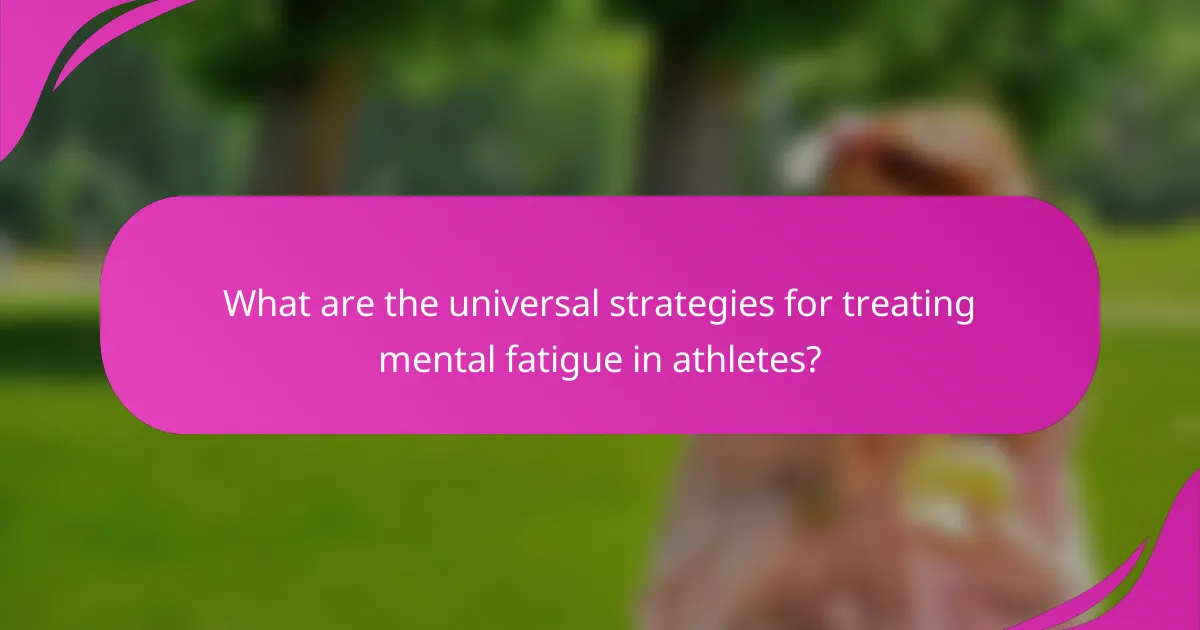
What are the universal strategies for treating mental fatigue in athletes?
To treat mental fatigue in athletes, focus on strategies that enhance focus, resilience, and performance. Effective methods include structured rest, mindfulness practices, and cognitive training.
Structured rest involves scheduled breaks to allow mental recovery. Mindfulness practices, such as meditation, improve concentration and reduce stress. Cognitive training exercises enhance mental agility and decision-making skills.
Incorporating these strategies can lead to improved performance and overall well-being for athletes.
How does proper sleep contribute to mental recovery?
Proper sleep significantly enhances mental recovery by restoring cognitive functions and reducing fatigue. Quality sleep aids in memory consolidation, emotional regulation, and decision-making, crucial for athletes. Research indicates that sleep deprivation can impair focus and resilience, negatively impacting performance. Prioritizing sleep as a recovery strategy can lead to improved athletic outcomes.
What role does nutrition play in combating mental fatigue?
Nutrition plays a critical role in combating mental fatigue by providing essential nutrients that enhance cognitive function. A balanced diet rich in omega-3 fatty acids, antioxidants, and vitamins can improve focus and resilience. For example, foods like fatty fish, berries, and leafy greens support brain health, reducing fatigue. Proper hydration is also vital, as dehydration can impair cognitive performance. Athletes should prioritize nutrient-dense meals and snacks to maintain energy levels and optimize mental clarity during training and competition.
How can hydration impact mental performance?
Hydration significantly enhances mental performance by reducing fatigue and improving focus. Adequate water intake supports cognitive functions, enabling athletes to maintain resilience during training and competitions. Studies show that even mild dehydration can impair attention, memory, and decision-making skills. For athletes, staying hydrated is crucial for optimal mental clarity and sustained performance.
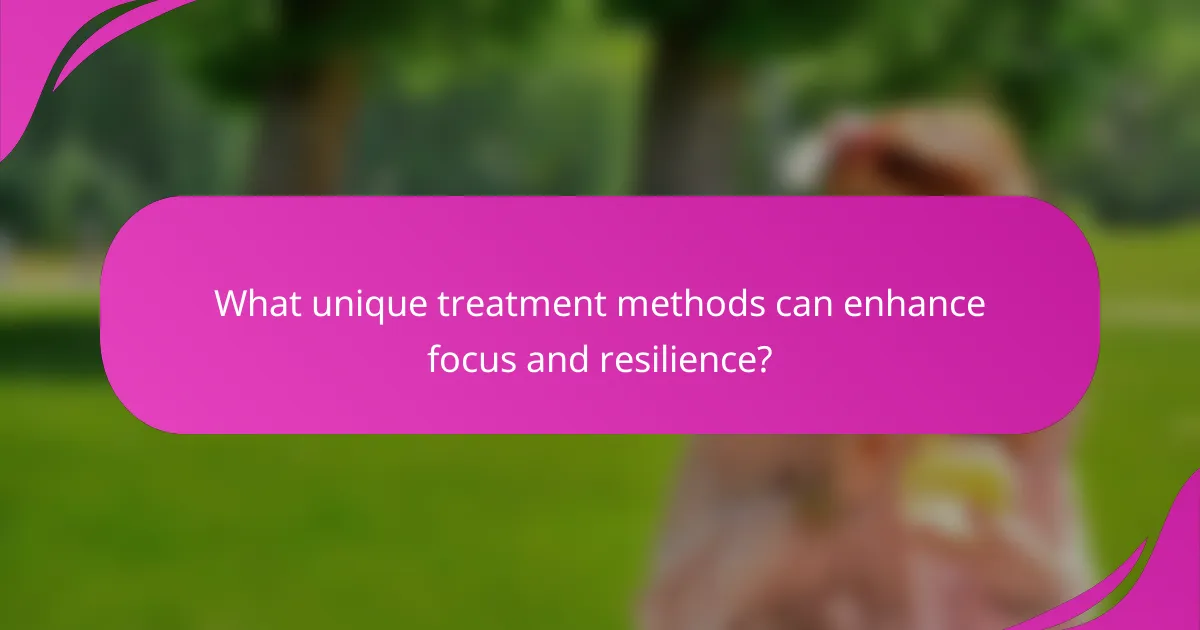
What unique treatment methods can enhance focus and resilience?
Mental fatigue treatment methods for athletes can enhance focus and resilience through several unique strategies. Techniques such as mindfulness meditation, cognitive behavioral therapy, and neurofeedback training have shown effectiveness.
Mindfulness meditation improves attention and reduces stress, allowing athletes to maintain focus during competition. Cognitive behavioral therapy helps in reframing negative thoughts, boosting mental resilience. Neurofeedback training offers real-time brain activity monitoring, assisting athletes in optimizing their mental state for peak performance.
Implementing these methods can lead to improved athletic performance and overall mental well-being.
How do cognitive-behavioral techniques assist in mental recovery?
Cognitive-behavioral techniques enhance mental recovery by promoting positive thought patterns and resilience. These strategies help athletes manage stress, improve focus, and develop coping mechanisms. Techniques such as cognitive restructuring, mindfulness, and goal setting are effective in reducing mental fatigue. Research indicates that athletes employing these methods experience improved performance and well-being.
What is the importance of mindfulness and meditation for athletes?
Mindfulness and meditation are crucial for athletes as they enhance focus, resilience, and overall performance. These practices reduce mental fatigue, allowing athletes to maintain clarity under pressure. Research shows that regular meditation can improve concentration by up to 50%, leading to better decision-making during competitions. Additionally, mindfulness techniques help manage stress, enabling athletes to recover more effectively from setbacks. Emphasizing mental well-being not only supports physical training but also fosters a competitive edge in high-stakes environments.
How can visualization techniques improve focus during competition?
Visualization techniques significantly enhance focus during competition by mentally preparing athletes for performance. These techniques help reduce anxiety, clarify goals, and foster a positive mindset. Athletes visualize successful outcomes, which can lead to improved resilience and performance under pressure. Research indicates that mental imagery can activate similar neural pathways as actual execution, reinforcing skills and strategies. This practice not only sharpens concentration but also combats mental fatigue, enabling athletes to maintain peak focus throughout competitions.
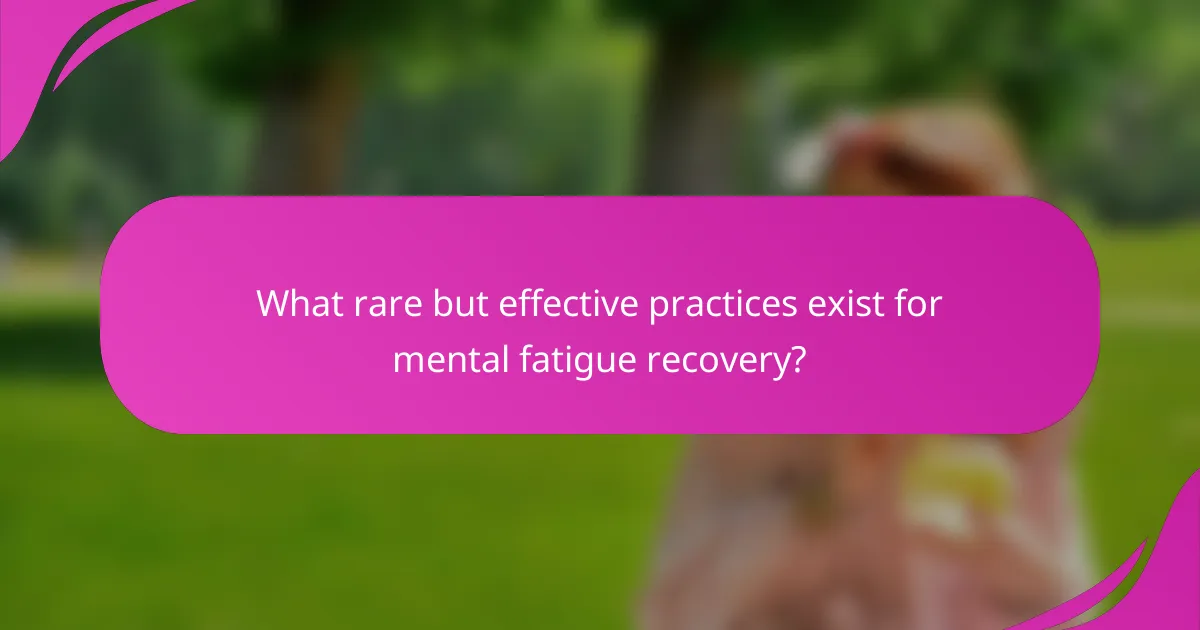
What rare but effective practices exist for mental fatigue recovery?
To recover from mental fatigue, athletes can employ rare but effective practices such as mindfulness meditation, sensory deprivation, and nature immersion. Mindfulness meditation enhances focus and reduces stress, while sensory deprivation allows for deep mental rest. Nature immersion provides restorative benefits, improving mood and cognitive function. These practices foster resilience and enhance overall performance.
How can neurofeedback training benefit athletes?
Neurofeedback training significantly enhances athletes’ focus, resilience, and performance. This method helps reduce mental fatigue by optimizing brain function, leading to improved concentration during training and competitions.
Studies indicate that athletes who engage in neurofeedback experience measurable increases in cognitive performance and emotional stability. This training targets specific brainwave patterns associated with peak performance, allowing athletes to enter optimal mental states more consistently.
Additionally, neurofeedback fosters resilience by teaching athletes to manage stress and anxiety effectively. This skill is crucial for maintaining performance under pressure, particularly in high-stakes situations.
Incorporating neurofeedback training into an athlete’s regimen can lead to long-term benefits, including sustained attention and quicker recovery from mental fatigue. As a result, athletes can maintain higher levels of performance throughout their training cycles and competitions.
What role does art therapy play in mental recovery for athletes?
Art therapy significantly aids mental recovery for athletes by enhancing emotional expression and reducing stress. It fosters resilience, allowing athletes to cope with mental fatigue effectively. Engaging in creative activities promotes focus and mental clarity, essential for peak performance. Research indicates that art therapy can lower anxiety levels and improve overall well-being, making it a unique approach in mental fatigue treatment. Athletes who incorporate art therapy report improved mood and motivation, which are critical for maintaining competitive edge.
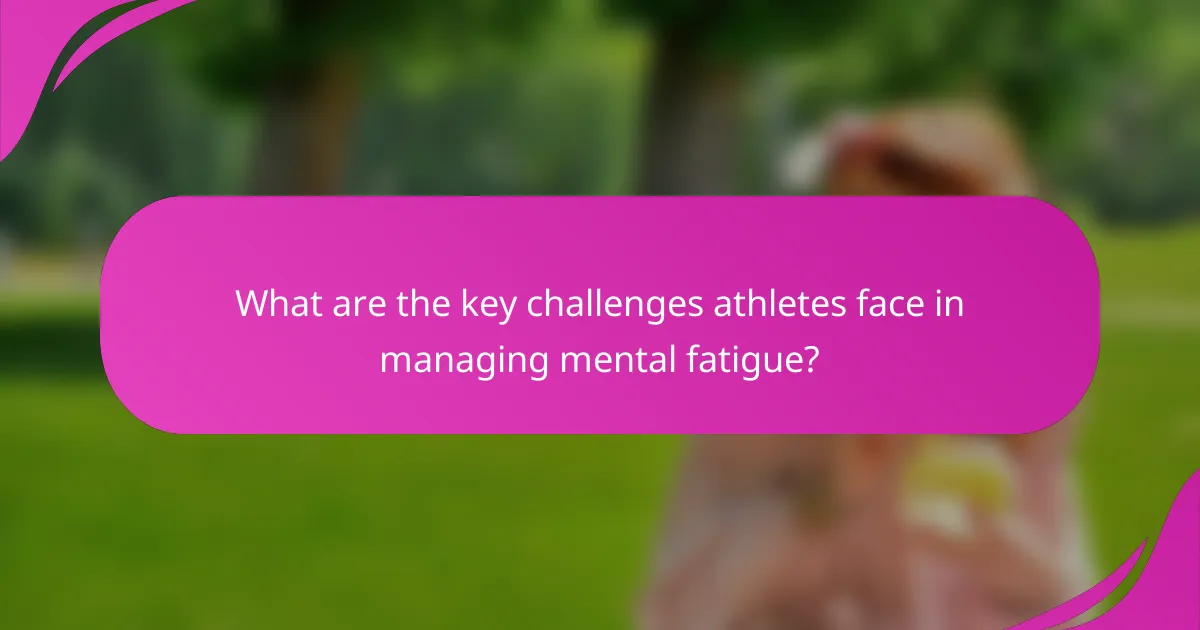
What are the key challenges athletes face in managing mental fatigue?
Athletes face several key challenges in managing mental fatigue, including stress, pressure to perform, and inadequate recovery. These factors can lead to decreased focus and resilience, ultimately impacting performance. Effective strategies encompass mental conditioning, mindfulness practices, and structured recovery protocols. Prioritizing mental health is essential for sustained athletic success.
How do competitive pressures contribute to mental fatigue?
Competitive pressures significantly contribute to mental fatigue in athletes, leading to decreased focus and performance. High-stakes environments create stress, which drains cognitive resources. Athletes often face expectations from coaches, peers, and fans, intensifying this mental load. As a result, effective mental fatigue treatment strategies must include techniques for managing stress and enhancing resilience. Incorporating mindfulness practices, structured recovery periods, and cognitive training can help athletes maintain focus under pressure.
What impact does social isolation have on an athlete’s mental health?
Social isolation negatively impacts an athlete’s mental health by increasing feelings of loneliness and anxiety. It can lead to mental fatigue, reducing focus and performance. Research indicates that athletes facing social isolation often experience decreased motivation and resilience. Strategies to combat these effects include fostering team connections and providing mental health resources. Engaging in regular social interactions can enhance overall mental well-being and performance.
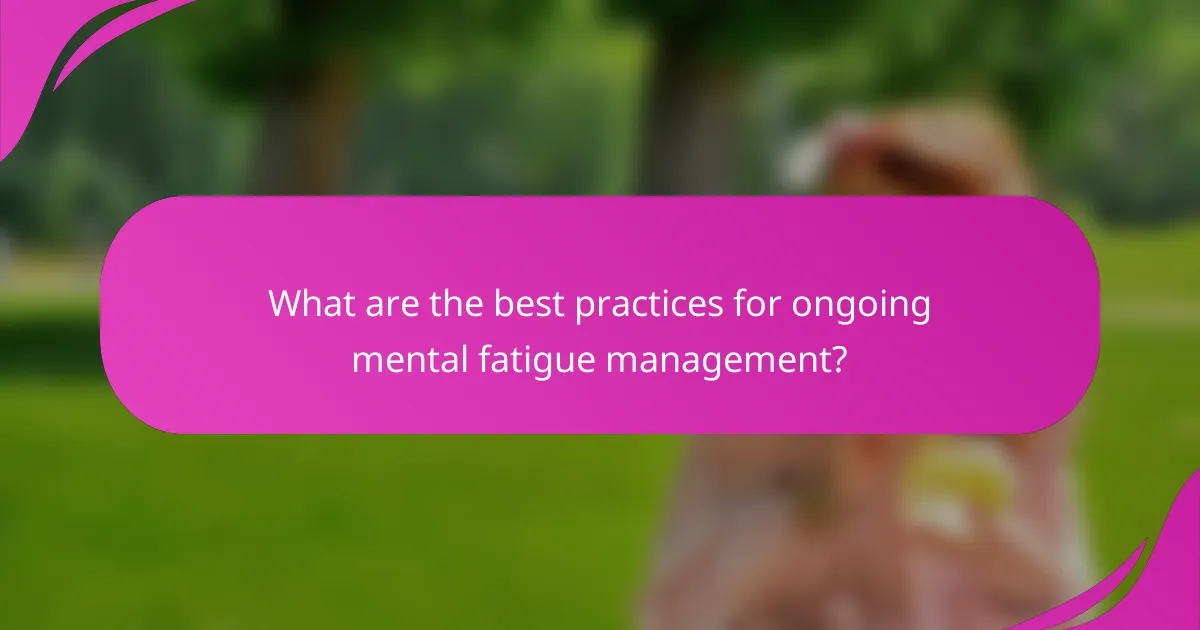
What are the best practices for ongoing mental fatigue management?
To manage ongoing mental fatigue effectively, athletes should employ strategies that enhance focus and resilience. Regular breaks during training sessions can prevent burnout. Incorporating mindfulness practices, such as meditation, fosters mental clarity. Adequate sleep is crucial; athletes should aim for 7-9 hours nightly. Nutrition plays a significant role; a balanced diet supports cognitive function. Setting realistic goals can help maintain motivation and reduce stress. Lastly, seeking social support from teammates or coaches can provide emotional resilience.
How can athletes create a personalized mental recovery plan?
Athletes can create a personalized mental recovery plan by assessing their unique needs and incorporating effective strategies. Start by identifying specific stressors and mental fatigue triggers. Next, integrate techniques such as mindfulness, visualization, and structured rest periods tailored to individual preferences. Regularly evaluate the plan’s effectiveness and adjust as necessary to enhance focus, resilience, and overall performance.
What common mistakes should athletes avoid in their mental recovery journey?
Athletes should avoid common mistakes such as neglecting mental health, underestimating recovery time, and failing to seek support. Prioritizing mental recovery is crucial for enhanced focus and performance. Not recognizing signs of mental fatigue can impede resilience. Additionally, athletes often overlook the importance of structured recovery strategies, which can lead to prolonged mental fatigue.
What expert insights can enhance mental resilience in athletes?
Expert insights can significantly enhance mental resilience in athletes through strategies that focus on cognitive training, mindfulness, and recovery techniques. Cognitive behavioral strategies help athletes reframe negative thoughts, promoting a growth mindset. Mindfulness practices, such as meditation, improve focus and reduce stress, enhancing overall performance. Recovery techniques, including adequate sleep and nutrition, play a crucial role in maintaining mental stamina. Engaging in regular mental exercises, such as visualization and goal setting, further strengthens resilience. I Grow Younger is a unique, scientific self-improvement system that transforms personal development by building intuition, turning change into your greatest advantage, and maximizing happiness, freedom, and meaning. These approaches collectively foster an environment conducive to peak performance.